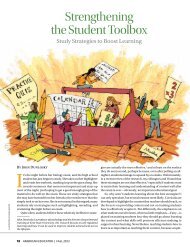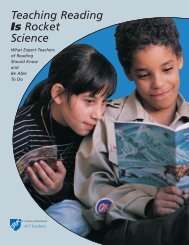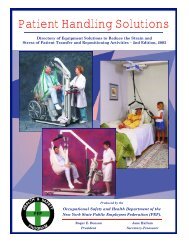American Educator, Winter 2010-11, Vol. 34, No. 4, AFT
American Educator, Winter 2010-11, Vol. 34, No. 4, AFT
American Educator, Winter 2010-11, Vol. 34, No. 4, AFT
Create successful ePaper yourself
Turn your PDF publications into a flip-book with our unique Google optimized e-Paper software.
ILLUSTRATIONS BY SERGE BLOCH<br />
Equality of<br />
Educational Opportunity<br />
Myth or Reality in U.S. Schooling?<br />
By William H. Schmidt,<br />
Leland S. Cogan, and Curtis C. McKnight<br />
Public schooling is often regarded as “the great equalizer”<br />
in <strong>American</strong> society. For more than 100 years, so the<br />
story goes, children all across the country have had an<br />
equal opportunity to master the three Rs: reading, writing,<br />
and arithmetic. As a result, any student willing to work hard<br />
William H. Schmidt is a university distinguished professor at Michigan<br />
State University as well as codirector of the Education Policy Center,<br />
where Leland S. Cogan is a senior researcher. Schmidt is also codirector of<br />
the U.S.-China Center for Research on Educational Excellence and codirector<br />
of the National Science Foundation–funded MSU PROM/SE project.<br />
Previously, he served as national research coordinator and executive<br />
director of the U.S. National Center, which oversaw U.S. participation in<br />
the Third International Mathematics and Science Study (TIMSS). Curtis<br />
C. McKnight is a professor of mathematics at the University of Oklahoma.<br />
For a more complete reference and description of the work in this article,<br />
please refer to an article just accepted for publication in a future issue of<br />
the <strong>American</strong> Journal of Education.<br />
12 AMERICAN EDUCATOR | WINTER <strong>2010</strong>–20<strong>11</strong><br />
has the chance to go as far as his or her talent allows, regardless<br />
of family origin or socioeconomic status.<br />
This assumption regarding opportunity and emphasis on individual<br />
talent and effort seems to be a natural offshoot of the rugged<br />
individualism and self-reliance that are so much a part of the fabled<br />
<strong>American</strong> character. We have long celebrated our cowboys, entrepreneurs,<br />
and standout athletes—but we have also long ignored<br />
those who have not succeeded. When success is individual, so is<br />
failure. It must result from a lack of effort, talent, motivation, application,<br />
or perseverance, not a lack of opportunity. Right?<br />
<strong>No</strong>t according to our research. Defining educational equality<br />
in the most basic, foundational way imaginable—equal coverage<br />
of core academic content—we’ve found that America’s schools<br />
are far from being the equalizers we, as a nation, want them to be.<br />
So what? Does it really matter that “the great equalizer” is a<br />
myth? To our way of thinking, it does. First, as researchers, we<br />
believe it is always important to question our assumptions—and<br />
that goes for our national assumptions about equality and individualism<br />
as well as our personal assumptions. Second, the more





